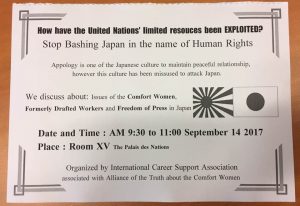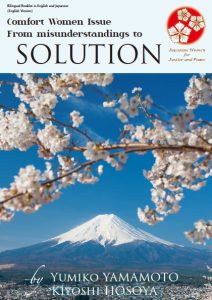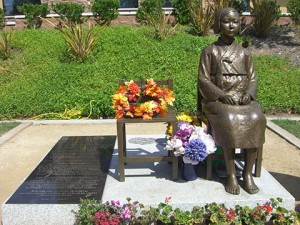In March 2017, Alliance for Truth about Comfort Women sent its fifth overseas delegation to Geneva, Switzerland to dispute the historical orthodoxy of comfort women at the United Nations Human Rights Council (UNHRC).
At the UNHRC, Tony Marano (a.k.a. Texas Daddy) gave a speech on behalf of the Alliance, taking advantage of the UN consultative status of the the International Career Support Association.
The delegation included, among others:
In March 2018, Alliance for Truth about Comfort Women sent its delegation to Geneva, Switzerland to attend the United Nations Human Rights Council, taking advantage of the UN consultative status of the International Career Support Association.
At the UNHRC, Sharon Isac of the Alliance gave a speech calling the historical accounts of comfort women “depraved highly defamatory myth.” In addition, former member of the Parliament Takashi Tanuma (田沼隆志) simultaneously refuted the UN Special Rapporteur David Kaye’s report describing curtailing of press freedom in Japan by the government and also argued that there is a pervasive censorship of any conversations critical of China or Korea on the internet.
The delegation included, among others:
In September 2016, Alliance for Truth about Comfort Women sent its fourth overseas delegation to Geneva, Switzerland to attend the United Nations Human Rights Council and to meet with officials at the UN Educational, Scientific and Cultural Organization (UNESCO) in charge of the agency’s Memory of the World Register.
At the UNHRC, Nobukatsu Fujioka of Japanese Society for History Textbook Reform gave a two-minute speech, taking advantage of the UN consultative status of the International Career Support Association.
The delegation included, among others:
In addition to the formal delegation, the Alliance for Truth about Comfort Women recruited members of the public to accompany the delegation for 268,000 yens each. Paying tourists were offered opportunities to enter United Nations functions as members of the International Career Support Association.
In September 2017, Alliance for Truth about Comfort Women and its affiliated groups sent its delegation to Geneva, Switzerland to attend the United Nations Human Rights Council, taking advantage of the UN consultative status of the International Career Support Association. Shunichi Fujiki spoke in a meeting about press freedom to accuse the U.N. Special Rapporteur David Kaye’s report critical of Japanese government of “bias,” while Mio Sugita attacked the government of South Korea for financing anti-Japan propaganda and “brainwashing” its citizens to foster hatred toward Japan.
In addition, the group held a side event titled “How have the United Nations’ limited resources been EXPLOITED? Stop Bashing Japan in the name of Human Rights.”
The delegation included, among others:

Australia-Japan Community Network (AJCN) is a group formed by Japanese residents in Australia in opposition to an effort by Korean community to establish a comfort women memorial in Australia. The group was founded by Tetsuhide Yamaoka (山岡鉄秀), who was ousted from the organization in late 2019 and is currently led by Sumiyo Egawa (江川純世). It works closely with members of Happy Science including Tetsuya Sato (佐藤哲也), who was the director of Happy Science Oceania HQ during the anti-memorial campaign, but AJCN and HS have opted to obscure the involvement of HS, according to their right-wing allies in Japan.
Under the leadership of Yamaoka, AJCN pursued a two-faced strategy emphasizing in English the need for harmony among various ethnic communities in Australia, while in Japanese it boosted comfort women denial and anti-Korean racism. The two-faced strategy was apparent when AJCN criticized in English that Korean community’s effort to erect a comfort women memorial because it “threatens to undo” Japan-ROK Agreement (2015), while in Japanese it bashed the agreement and called for its nullification. Egawa even bragged about this “innovative” strategy in social media in Japanese. After Yamaoka returned to Japan, the group began publishing more transparently denialist and anti-Korean articles in English as well, such as “why do Korean children bully Japanese children?”.
In December 2016, Australia-Japan Community Network filed a complaint under Australia’s Racial Discrimination Act of 1975 against the Uniting Church of Sydney, which has installed a memorial dedicated to the victims of Japanese military comfort women, claiming that the memorial “offends, insults, humiliates, or intimidates” Japanese Australians. Racial Discrimination Act however protects “artistic works, scientific debate and fair comment on matters of public interest” so long as they are expressed “reasonably and in good faith.”
AJCN’s complaint was dismissed in January 2017, but the organization filed yet another complaint with the Australian Human Rights Commission.
Website: http://jcnsydney.blogspot.com/
Channel Sakura or Japanese Culture Channel Sakura (日本文化チャンネル桜) is a conservative television production company and internet station founded in 2004 to “restore traditional Japanese culture and Japanese national soul.” President and Director Satoru Mizushima founded Channel Sakura along with Shiro Takahashi, Yoshiko Matsuura, and others.
Current and former personalities for Channel Sakura include, in addition to Mizushima, Miki Otaka, Mio Sugita, Kohyu Nishimura, Shigeharu Aoyama, Koichi Sugiyama, Genki Fujii, Yoshiko Matsuura, and others.
This page links to the activities of right-wing Japanese comfort women deniers at the United Nations.
2014
2015
2016
2017
This page links to the activities of Japanese comfort women deniers in the United States.
2014
2015
2016
2017
“Comfort Women Issue: From Misunderstandings to Solution (慰安婦問題 誤解から解決に向けて)” is the title of a 2016 booklet published in both English and Japanese by Nadeshiko Action authored by Yumiko Yamamoto and Kiyoshi Hosoya and translated (badly) by Kiyoshi Hosoya and Sharon Isac.
The booklet starts with a revisionist overview of Japanese history which claims that “Japan is classless society. We have no history of slavery. We have very little sense of discrimination. We treat people at disadvantage with compassion and warmth, as did the Japanese military during WWII.” It reproduces the same old denier arguments that have been thoroughly debunked decades ago.
Hosoya and Yamamoto have been distributing copies of this booklet at the UN Commission on the Status of Women NGO Parallel Events (2016) and elsewhere.

In July 2014, City of Glendale, California enacted a “peace memorial” dedicated to the victims and survivors of Japanese military comfort women system in the City’s Central Park. Since then, Japanese right-wing nationalists have protested the memorial, even filing lawsuits against the city (see Gingery et al. v. City of Glendale) to seek its removal.
The memorial was endorsed by a coalition of Asian American groups, including Korean American Forum of California, Nikkei for Civil Rights and Redress, and the local (San Fernando Valley) chapter of the Japanese American Citizens League. A group made up of local Japanese residents and first-generation Japanese immigrants (often referred to as “shin issei” or “new first generation”) led by Koichi Mera opposed it.
Since the establishment of the memorial, Japanese right-wing media such as Channel Sakura claimed that the statue led to the rampant bullying and hate crimes against Japanese children in Glendale and surrounding areas. The claim has been thoroughly debunked by local authorities, schools, national media, and Japanese American groups.




